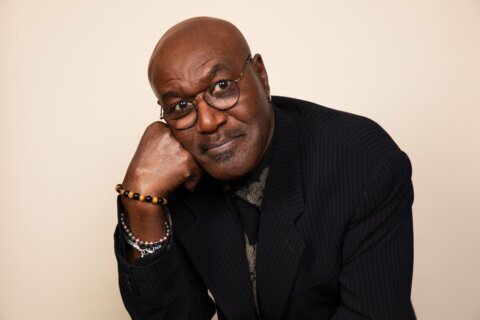Coming of age is hard enough. It’s even harder when you just lost your older sister.
That’s the angle of “The Sky is Everywhere,” a unique new teen drama on Apple TV+ that’s as heavy as it is creative in grappling with issues of romance in the aftermath of tragedy.
Adapted by Jandy Nelson from her 2010 young adult novel, the film follows high-school clarinet player Lennie Walker, who dreams of love by incessantly reading “Wuthering Heights,” while hoping to audition for “first chair” in the high-school band to boost her chances at Juilliard. Both are interrupted when her beloved older sister suddenly dies.
Lead actress Grace Kaufman has mostly done television, from CBS’ “Man with a Plan” to TNT’s “The Last Ship” to Disney’s “Whisker Haven Tales with the Palace Pets,” but she recently played Rebecca Hall’s daughter in the Sundance premiere “Resurrection” (2022).
In “The Sky is Everywhere,” she carries the film by symbolically pinning her hair up during anxiety and letting it down during relief. She feels authentic in small moments, fingers fidgeting at waist-level, then erupting in emotional breakdowns surrounded by her late sister’s wardrobe and bedroom portrait watching her every move like “Laura” (1944).
Unlike “Ordinary People” (1980), Lennie doesn’t even have parents to grieve with. Her dad ran off and her mom died young. Instead, she lives among the redwoods of Northern California with her hippie guardians, her gardening grandmother Fiona (Cherry Jones, “Signs”) and her pot-smoking uncle Big (Jason Segel, “Forgetting Sarah Marshall”).
The modern family is constantly inviting people over, including her late sister’s grieving boyfriend Toby Shaw (Pico Alexander). Things get weird as the lines of grief and love blur, complicating her crush on guitarist classmate Joe Fontaine (Jacques Colimon). The latter is everything she wants going forward, while the former represents the weight of her past.
“The weirdest part about grief, the most inappropriate part, is that all of a sudden, since Bailey died, I can’t stop thinking about just falling into someone’s arms,” Lennie says.
The two rival lovers are often shown through doorways and garden trellises for visual juxtapositions by director Josephine Decker, who gained acclaim at AFI Fest with “Thou Wast Mild and Lovely” (2014), South by Southwest with “Collective: Unconscious” (2016) and lately, at Sundance with “Madeline’s Madeline” (2018) and “Shirley” (2020).
In “The Sky is Everywhere,” Decker decks out her frame with impressive magical realism, including pages of her diary floating through the sky, animated storm clouds appearing over crying characters, and two young lovers magically lifting into the air like “La La Land.” The tone fits for a generation raised on Julie Taymor’s “Across the Universe” (2007).
Decker seems to follow Fiona’s advice, “It’s such a colossal effort not to be shattered by what was lost, but to be enchanted by what was.” Enchantment runs wild in this film.
Most imaginative is a scene where Lennie and Joe drift away listening to Bach in a pair of earbuds while laying in the forest. Instead of CGI branches swaying to the music, an ensemble of leaf-covered humans wave their hands and bizarrely spoon their bodies.
It’s as if Decker watched Julia Ducournau’s “Titane” (2021) and said, “Oh yeah? You want to show sex with a car? I raise your Cadillac with a Sequoia.” Afterward, Joe asks Lennie, “Did we just have sex?” You’ll laugh, “Yeah, with a tree.” Was it good for you, Dr. Seuss? Oh yes, I speak for the trees! Just be careful lighting that cigar, Smokey, you might start a forest fire.
Even if the creativity goes a little too far at times, it’s better to swing for the fences with imagination than follow a cookie-cutter recipe. “The Sky is Everywhere” is mostly wondrous, inventive and heartfelt, while dealing with the darkest of human emotions. It even has a biting sense of humor like Uncle Big getting as “high as possible” at the end.
I see what you did there, Decker. Puntastically played.
In the end, we see Lennie make amends with her mean-girl rival, but we never actually see her audition for “first chair,” much less go to Juilliard. For this reason, we don’t float out of the theater with a fulfilling recital climax like “Whiplash” (2014) or “CODA” (2021). Still, there is a fun twist down the stretch that doesn’t feel like a page out of any other movie.
As wet cut to black for the end credits, Lennie’s words echo, “There were once two sisters who were not afraid of the dark, because the dark was always full of the other’s voice.”









